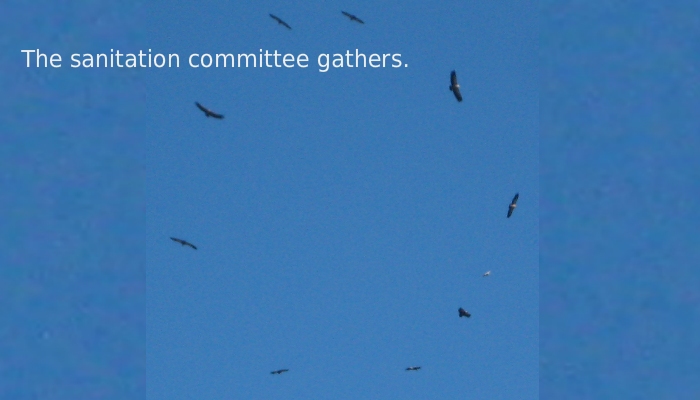Have You Come For Me?

To native people around the world, wild animals have served many roles beyond the utilitarian. Across cultures different species are omens, advisors, confidents, saviors, sacrifices, Gods, distributors of rain and drought, messengers, carriers of souls, mentors, and adversaries.
Last week I was walking down toward the children’s beach at our pond to repair something, and partway down the hill realized that a vulture was gliding in low and slow on the same trajectory. It landed on the little lawn in front of the beach, while I paused to wonder why. As I continued walking toward it slowly, it edged nervously back a bit, but didn’t leave. And I still couldn’t see anything dead to attract it. Finally with me at rather close range, it flew up onto the hillside trail not far away and continued to monitor the situation.
So I sat down on the picnic table under the willow and watched the vulture, who was watching me, and it occurred to me that around the world the vulture family is known to accompany death. And they have an incredibly sensitive sense of smell, allowing them to sniff out the dead and the dying. So I began wondering whether me and my damaged heart valve were sending an olfactory signal and I was the object of its interest. Having spent the past several weeks in and out of clinics doing assorted other non-invasive scans, it seemed like a plausible hypothesis.
We looked at each other a bit longer and I asked, “Have you come for me?” The bird fluffed out its feathers and stood a little taller and then settled back down, and I didn’t know whether this was a reply. This made me suppose that the prudent move on my part would be to walk back up to the house, and perhaps avoid turning this scene into a testable hypothesis.
So I thanked the vulture for the warning, if that is what it was. And as I stood up I smelled a hint of something dead, which I was pretty sure wasn’t me. Lying on a branch of the willow tree overhead was the blackened carcass of a large bullfrog.
And suddenly a new hypothesis became viable. I had burned the adjacent wetland last week and the frog had probably been killed by the flames. The Prairie Green School children were playing here after that, and had no doubt found the frog and stood atop the picnic table to cache it up in the tree, which also nicely explained the muddy scuff marks on the table. And then the vulture was searching the ground, where dead frogs are supposed to be.
So I took the frog down, waved it so the vulture could see it, put it in the grass and departed. This took me again toward the vulture, who immediately lifted off and flew in a broad loop so that we were trading places. No misunderstandings now.
I was glad to be of service, they play such a useful role in our ecosystems. And delighted to have my first hypothesis remain untested.
This spring, spend some quality time outdoors with The Others, and who knows what you might learn about them, or yourself.
Tags: Lon Drake

